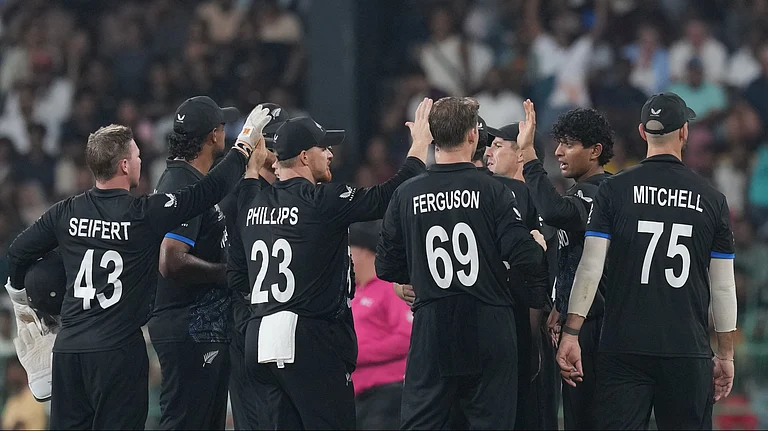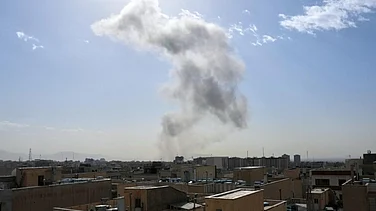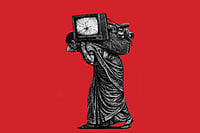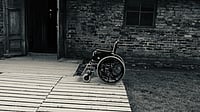“There are no heroes and incredible feats, there are simply people who are busy doing inhumanly human things. I write not about war, but about human beings in war. I write not the history of a war, but the history of feelings. I am a historian of the soul.”
—Svetlana Alexievich, The Unwomanly Face of War: An Oral History of Women in World War II
I don’t know her name, but night after night, I have scrolled through the devastation in Gaza on my phone and she haunts me still. A girl with Down syndrome, biting her nails, sitting amidst Gaza’s ruins, looking around her with a gaze that breaks the claim of alphabets to form a meaning, a metaphor. In her eyes, loneliness, despair and helplessness are mixed with a strange fear. There was a lot more. I can’t string together a sentence to describe it. The text on that video said she had lost her parents in the Israeli airstrikes.
A single image can alter your world. A single image can plunge you into despair. A single image can also make you more humane.
Over the last 53 days, we have seen a lot of polarisation, we have witnessed misinformation galore, a lot of aggression, a lot of justification, a lot of explanation and a lot of colour.
To me, as a reporter and as an editor, Gaza is a black event. There are no sides to pick here. I won’t pick loneliness, and war gives you that. An extreme loneliness.
As a reporter and an editor, I don’t anymore place my belief in time being just. Time will, perhaps much later, correct things, and we can only hope it’s free of our present prejudices. But I am also mindful and terrified that history, which time will remember, may not be accurate, not just.
We have to call out our own truths. We have to counter the falsehoods and mostly, we have to stand up for love because I still believe that only love can save us from betrayals of all kinds.

As a journalist, I am no longer bound by the “objectivity” theory because I know that papers lie. Who is to then archive feelings? We are limited by facts sometimes. We must collect feelings, write them and hope that someone reads them, and they can feel for others. Our job now is even tougher. Beyond the facts, we have to learn to find and protect feelings. We must learn now more than ever to confront feelings and get past our prejudices.
They ask me if I condemn Hamas. They ask everyone if they condemn Hamas. That’s what you see television anchors do. I say to them, I condemn violence. I despair seeing rubble powdering children’s faces, as if they are from another world.
All children, all people are us. The one thing this war in Gaza has shown us is that we can be so numb. Every day, more people are dying. Many journalists are dead. Many are still documenting life in Gaza and that’s how we see the horror. For once, I feel social media has pushed us to confront our own biases. It is not easy to see all of it for hours. More deaths, more loss, more loneliness, more confrontation with feelings.
Gaza is not elsewhere. It is a place on this planet with people like us. Most of the media has failed the people of Gaza.
They ask me if the readers will care to read stories about Gaza because all newsrooms cater to specific audiences, that we are here and they are there, that we are Indians and they are the others.
I say that I am not a product of my time or of my profession. My allegiance is to storytelling. That allegiance is built on feelings.
For a child who has lost parents, it is a loss of everything and of memory itself. For parents to lose a child is the loss of a future, of memory of what could have been.
When I say language is not equipped to catch up with us, who invent new horrors, I say it because I can’t describe the girl’s eyes. I can’t describe the image of a woman holding her dead child in Gaza. I can’t cast into words the image of a dead child whose fingers still tug at his father’s collar.
There is no single word that describes a “person who has lost a child” in English.
We, who speak and write in English, have “widow” and “widower” and “orphan”.
In Arabic, there is that word. It is “thakla” that refers to a parent who has lost a child, usually a grieving mother.
We live in a world, and not a supermarket. And to live is to be responsible for what we say, write and feel.
Outlook feels. That’s our journalism. To keep feeling and keep putting stories of people out there to tell them we are here, and maybe it can make them feel a little less lonely.
I hope the girl with Down syndrome is alive. I hope the skies over Gaza are no longer lit by bombs.
I don’t know what they mean when they say the “right side of history”, but what I do know is that we are on the side of the people in Gaza and innocent children, who are ending up as numbers and facts, and not as humans.
Gaza is not a separate people. There are no winners in this. There is only more loss and loneliness. More despair. And everything else that girl’s eyes contained that make words crumble.
(This appeared in the print as 'Gaza Is Not Elsewhere')


























